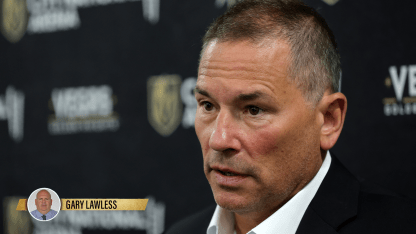Q&A: Bruce Cassidy with Gary Lawless | Part 2
VGK Head Coach talks about his coaching career

GL: Your demeanor on the bench, we're just getting to know you. You seem competitive on the bench, and then really kind of fun and relaxed away from it. How does your personality mix to create that?
BC: I think when the puck drops, when there's competition, I'm a competitive guy. Same way on the golf course: I'm a great guy to play golf with, because I don't throw my clubs and I don't get upset, but when I'm over a shot (I'm intense). If I miss a putt that I feel like I should make, I'm really upset with myself. Yet I can be relaxed at the same time immediately after.
That's a bit of my coaching style. I'm competitive on the bench and I get intense, and I get emotional. You have to channel that because you're a leader. Sometimes players can feed off that energy and emotion in a good way, and sometimes it can affect them in a negative way. So, to me, it's always about control and using it in the right way, to push guys and also to create some energy.
A lot of times, I'm more upset with myself that I'm not prepared for the situation. Players misunderstand sometimes where it's directed. I've got to do a better job directing it, and then correcting it, which I usually do between periods. You have to take the emotions out of it. That's always been a part of me coaching, and I've worked on it for a long time. Like I said, it can be constructed as a positive or a negative depending on how you want to write the story. It was constructed as a positive for a lot of years and it was constructed as a negative in recent years. That's the way it goes sometimes.
GL: Two things come up from that. I heard a coach said to me one time, you're at home with no job and the phone rings and there's a team and they're chasing you like they're chasing a date, like they're courting you to come and join their team. And then they have a press conference and tell the whole world how great you are. Sign you to a contract and turn the keys over to the organization. Then one day, they say "you know what, we don't love you anymore, give us our keys back." What's that like? Is that accurate first of all?
BC: I think there's some truth in that obviously. They're recruiting you to join their organization, different teams go at it at different ways. Different organizations, any company, sometimes they throw whatever you want at you. Other people, this is why, join us, because we'll help you as much as you're going to help us. So, yes, I would say it's generally accurate.
I think the relationship doesn't just end one day; I think it's like a marriage. People who get divorced, it usually isn't just one thing, although certainly that happens. Things deteriorate over time, I think that's what happens with coaches and players. If you have an ultimate goal and you don't reach it, it deteriorates over time. Even when you do reach it, coaches have won a Cup and were fired very recently after.
The more coaches understand the organizational philosophy, the better off (they) are. Listen, they're going to want to date you and they don't want to marry you for life. If you could accept that, you'd probably function better. The day you're hired, you're on the clock, I mean you know that. It's still hard to wrap your head around knowing that they're not going to like you. You're not going to be good enough. I think there's a bit of that is human nature that goes into coaches. I think sometimes, they'll react differently. Some get defensive, some don't communicate anymore because they just go hide in their room and do their work. Then you lose touch with people, there's a lot of different things that happen. In a good coach-GM relationship you have to keep building that, so that you can get through those tough times. Players can see that hierarchy, when people are on the same page and have the same accountability standards and things in place, that through the rough stretch they stick with it better.
I do believe that, because a player will look at it and say there is a fracture up top. I think people underneath you in the organization, stick together, at least show strength and make it easier to get through. That's when coaches typically get let go, I think my situation is a little different. Typically, you're not winning, then it snowballs, and you're not winning.
GL: Were you surprised when got fired in Boston?
BC: Yes, but not shocked. I've always said that Boston expects championships, playoff success. When I walked away from that job, what did I learn? Of course I've learned stuff in the day-to-day, you know you've got to communicate better, you have to understand people. You know, there's always that going on, from the beginning of time when you're working. How you message, all those skills you build every year, and you've got to keep working on it. How you delegate.
We didn't win enough in the playoffs, that's how I took it. If we beat Carolina in Game 7 am I still coaching the Bruins right now? Maybe, maybe not, only they can answer that. I just felt that we didn't win enough in the playoffs. That was the expectation and it is in a lot of places.
GL: It is a weird dynamic in the sense that, you don't build the roster.
BC: That's it, the groceries, if I'm going to be the cook, I want to be the one that shops for groceries. That's why - and I'll get to your question - that's why college football coaches struggle when they go to the NFL, because they've done all their shopping for years, and now here's the groceries you have to make a great souffle out of it. The Bruins are doing great, I think there are a few different reasons for that beyond simply changing the coach, personally. I might be biased. I think Jim Montgomery has done a great job. I believe he's a good coach, he's a smart guy.
When I took over the Bruins, Claude Julien had laid out a foundation and I didn't all of a sudden come in and rip out that foundation. I built off that foundation and added-funny part of that, offense to that foundation. Then one of the reasons I got let go was that I didn't get enough scoring in the playoffs to win those rounds. So, we got away from that or we didn't get enough.
I know Boston, I've worked 14 years there, I know the team pretty well and I know what I took over, and I was thankful for Claude when he built that. Just like those younger guys, Matt Grzelcyk, Charlie McAvoy, Brandon Carlo, Connor Clifton, every one of those young defensemen came up through our guidance, so there's a certain level of pride knowing you did that. David Pastrnak went from a good player to an elite player, I think we did some really good work there. I think they added to the roster this year. David Krejci coming back was a big add. He was a popular guy in the room and good player. Hampus Lindholm being healthy has helped them a lot. So that's what's happening in Boston, and we'll see if they'll win in the playoffs. They have a great group of guys, but that's a tough time of year and is a way away. Linus Ullmark.
One of the reasons that the Vegas Golden Knights have been successful is because we play good team defense, but Logan Thompson has been playing well. You get goaltending, it just effects your game in so many different ways. Not only the scoreboard but confidence. Ullmark is doing that for Boston.


















